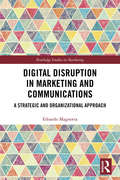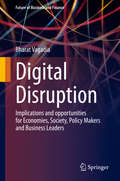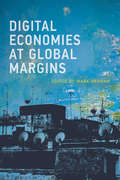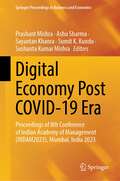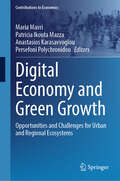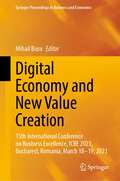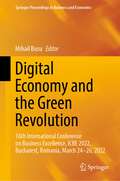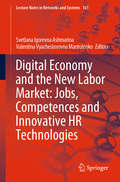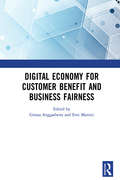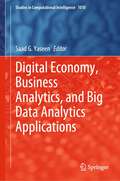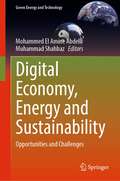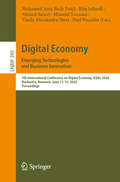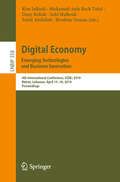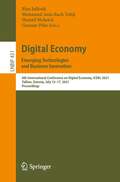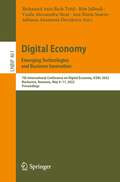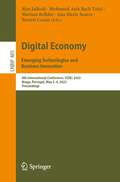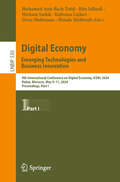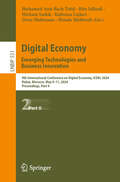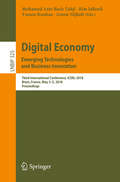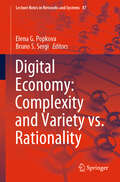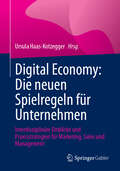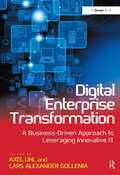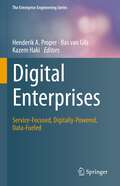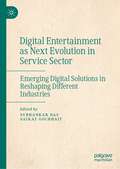- Table View
- List View
Digital Disruption in Marketing and Communications: A Strategic and Organizational Approach (Routledge Studies in Marketing)
by Edoardo MagnottaThis book sets out the new frontier of marketing and communication through real case histories. Companies must rethink their traditional approaches to successfully face the upcoming challenges. They must learn how to innovate and change things when they go well. New emerging technologies such as AI and IoT are the new frontiers of the digital transformation that are radically changing the way consumers and companies communicate and engage with each other. Marketing makes a company a change-maker, while communications tell the story to engage customers and stakeholders. The book introduces brand positioning (to match brand values and consumers’ attributes), and brand as human being (to raise trust, loyalty and engagement among customers and stakeholders), through Enel X and its partnership with Formula E in the e-mobility case, and the PMI case (its disruptive effect on tobacco industry). After a deep analysis of the disruptive effects on business models of the digital transformation, the book explores digital communications through the Pietro Coricelli case (how a well-designed digital strategy can raise reputation and sales). The book also provides a new holistic approach and identifies a future leader, through the H-FARM case (how to disrupt business models and education). The book is aimed at researchers, students and practitioners, and provides an improved understanding of marketing and communications, and the evolution of the strategic, organisational, and behavioural model.
Digital Disruption: Implications and opportunities for Economies, Society, Policy Makers and Business Leaders (Future of Business and Finance)
by Bharat VagadiaThis book goes beyond the hype, delving into real world technologies and applications that are driving our future and examines the possible impact these changes will have on industries, economies and society at large. It details the actions governments and regulators must take in order to ensure these changes bring about positive benefits to the public without stifling innovation that may well be the future source of value creation. It examines how organisations in a world of digital ecosystems, where industry boundaries are blurring, must undertake radical digital transformation to survive and thrive in this new digital world. The reader is taken through a framework that critically examines (i) Digital Connectivity including 5G and IoT; (ii) Data Capture and Distribution which includes smart connected verticals; (iii) Data Integrity, Control and Tokenisation that includes cyber security, digital signatures, blockchain, smart contracts, digital assets and cryptocurrencies; (iv) Data Processing and Artificial Intelligence; and (v) Disruptive Applications which include platforms, virtual and augmented reality, drones, autonomous vehicles, digital twins and digital assistants.
Digital Divide Data: A Social Enterprise in Action
by Marc J. Epstein Herman B. Leonard Wendy K. SmithAn abstract is not available for this product.
Digital Economies at Global Margins (International Development Research Centre)
by Mark GrahamInvestigations of what increasing digital connectivity and the digitalization of the economy mean for people and places at the world's economic margins.Within the last decade, more than one billion people became new Internet users. Once, digital connectivity was confined to economically prosperous parts of the world; now Internet users make up a majority of the world's population. In this book, contributors from a range of disciplines and locations investigate the impact of increased digital connectivity on people and places at the world's economic margins. Does the advent of a digitalized economy mean that those in economic peripheries can transcend spatial, organizational, social, and political constraints—or do digital tools and techniques tend to reinforce existing inequalities?The contributors present a diverse set of case studies, reporting on digitalization in countries ranging from Chile to Kenya to the Philippines, and develop a broad range of theoretical positions. They consider, among other things, data-driven disintermediation, women's economic empowerment and gendered power relations, digital humanitarianism and philanthropic capitalism, the spread of innovation hubs, and two cases of the reversal of core and periphery in digital innovation.ContributorsNiels Beerepoot, Ryan Burns, Jenna Burrell, Julie Yujie Chen, Peter Dannenberg, Uwe Deichmann, Jonathan Donner, Christopher Foster, Mark Graham, Nicolas Friederici, Hernan Galperin, Catrihel Greppi, Anita Gurumurthy, Isis Hjorth, Lilly Irani, Molly Jackman, Calestous Juma, Dorothea Kleine, Madlen Krone, Vili Lehdonvirta, Chris Locke, Silvia Masiero, Hannah McCarrick,Deepak K. Mishra, Bitange Ndemo, Jorien Oprins, Elisa Oreglia, Stefan Ouma, Robert Pepper, Jack Linchuan Qiu, Julian Stenmanns, Tim Unwin, Julia Verne, Timothy Waema
Digital Economy Post COVID-19 Era: Proceedings of 8th Conference of Indian Academy of Management (INDAM2023), Mumbai, India 2023 (Springer Proceedings in Business and Economics)
by Sumit K. Kundu Sushanta Kumar Mishra Sayantan Khanra Prashant Mishra Ashu SharmaThis book presents the future directions of the digital economy post Covid-19 era. The chapters of this book cover contemporary topics on digital economy and digital initiatives undertaken by various organizations. Overall, the book shares insights on how organizations can adapt and transform their processes, structure, and strategies to remain relevant and competitive in the new business and economic environment. These insights also emerge from multidisciplinary discussions in various management domains, such as, consumer behaviour and marketing, economics, finance and accounting, entrepreneurship and small business management, environmental, social and governance compliance, future of work, human resource management, leadership, inclusive workforce, information systems and decision sciences, international business and strategy, and operations and supply chain management.
Digital Economy and Green Growth: Opportunities and Challenges for Urban and Regional Ecosystems (Contributions to Economics)
by Anastasios Karasavvoglou Persefoni Polychronidou Maria Mavri Patricia Ikouta MazzaIn the light of digital transformation and the role of information and communication technologies for economic development, this volume discusses the challenges and opportunities for a new digital economy and regional and sustainable development of countries in the Balkans and Eastern Europe. It features selected contributions on topics such as regional economic growth, e-government strategies, the role of global value chains, smart cities and other issues related to digital transformation. The book will appeal to scholars and practitioners in economics, regional science, business and management, as well as those interested in sustainable urban and regional ecosystems.
Digital Economy and New Value Creation: 15th International Conference on Business Excellence, ICBE 2021, Bucharest, Romania, March 18–19, 2021 (Springer Proceedings in Business and Economics)
by Mihail BusuThis book constitutes a selection of the best papers from the 15th International Conference on Business Excellence, Digital Economy and New Value Creation, ICBE 2021, held in Bucharest, Romania, in March 2021.This book is a collection of research findings and perspectives related to the digital economy and new value creation, led by the set of improvements and changes in the economic, societal and technological structures and processes towards the effort of reaching the sustainability goals.
Digital Economy and the Green Revolution: 16th International Conference on Business Excellence, ICBE 2022, Bucharest, Romania, March 24-26, 2022 (Springer Proceedings in Business and Economics)
by Mihail BusuThis book presents a selection of the best papers from the 16th International Conference on Business Excellence, “New Challenges of the Century. Digital Economy and the Green Revolution” (ICBE 2022), held in Bucharest, Romania, in March 2022. Showcasing research findings and perspectives on the new challenges posed by the digital economy and research systems, the book offers valuable insights into the present context of global crisis, together with solutions for the real-world challenges we face today.
Digital Economy and the New Labor Market: Jobs, Competences and Innovative HR Technologies (Lecture Notes in Networks and Systems #161)
by Svetlana Igorevna Ashmarina Valentina Vyacheslavovna MantulenkoThis proceedings book contains papers presented at the XI International Online Forum named after A.Ya. Kibanov “Innovative Personnel Management,”, which took place in Moscow, Russian Federation, 15th April–5th May 2020. Organized by Moscow State University of Management, the Forum chiefly focused on HR management issues under conditions of active penetration of IT into the management and economic sphere. The authors of contributions included in this book examine both the theoretical basis for the development of the labor landscape in our digital future, and specific practical issues related to the real business practice. The book includes results of multidisciplinary studies on the following issues: employment and the labor market: a future perspective; current trends of HR management development in digital conditions; IT for creating healthy work conditions; digital transformation and new architecture of the labor market; innovative, strategic HR management and HR analytics; leadership, etc. The book consists of six parts corresponding to thematic areas of the Forum. The first part deals with the transformation of the labor market under the influence of digitalization and international economic relations. The second part is devoted to the analysis of the current changes in the HR management caused by digitalization, as well as issues of creating a healthy work environment and managing well-being with information technology. New architecture of the labor market is considered in the third part of the book in the face of the global uncertainty and the application of digital technology in entrepreneurial activities. The fourth part investigates innovative approaches to the personnel development: from resource management to capacity management. The fifth part presents strategic HR management and HR analytics in the context of current macro-calls. And finally, the sixth part is aimed at considering leadership aspects and relations between investments in the human capital and needed business results. This book is a combination of different scientific opinions and research works of scholars from different countries and regions, offering us a colorful picture of the future labor landscape: jobs, competences and skills that will be in demand.
Digital Economy for Customer Benefit and Business Fairness: Proceedings of the International Conference on Sustainable Collaboration in Business, Information and Innovation (SCBTII 2019), Bandung, Indonesia, October 9-10, 2019
by Grisna Anggadwita Erni MartiniThe international conference "Sustainable Collaboration in Business, Technology, Information and Innovation (SCBTII) 2019" has brought together academics, professionals, entrepreneurs, researchers, learners, and other related groups from around the world who have a special interest in theories and practices in the development of the field of digital economy for global competitiveness. Considering that, at present, technology and industry 4.0 are still a leading trend and offer great opportunities for global businesses, the rise of industry 4.0 makes competition in the business world more attractive, yet fierce. Opportunities and challenges for business development in industry 4.0 are becoming firm and it also provides businesses the possibility to compete globally. Companies that desire to enter this global competition should pay attention to customer benefits and business fairness in order to achieve sustainability in this digital economy. This proceedings volume contains selected papers from this conference and presents opportunities to communicate and exchange new ideas and experiences. Moreover, the conference provided opportunities, both for the presenters and the participants, to establish research relations, and find global partners for future collaboration.
Digital Economy, Business Analytics, and Big Data Analytics Applications (Studies in Computational Intelligence #1010)
by Saad G. YaseenThis book is about turning data into smart decisions, knowledge into wisdom and business into business intelligence and insight. It explores diverse paradigms, methodologies, models, tools and techniques of the emerging knowledge domain of digitalized business analytics applications.The book covers almost every crucial aspect of applied artificial intelligence in business, smart mobile and digital services in business administration, marketing, accounting, logistics, finance and IT management.This book aids researchers, practitioners and decisions makers to gain enough knowledge and insight on how to effectively leverage data into competitive intelligence.
Digital Economy, Energy and Sustainability: Opportunities and Challenges (Green Energy and Technology)
by Muhammad Shahbaz Mohammed El Amine AbdelliThis book looks at how digital economy can help energy businesses to meet their sustainability goals. It will further generates a new debate among policymakers about encouraging green technologies to reduce global carbon emissions.Our modern society requires a long-term, sustainable, and secure energy supply that not only generates and preserves renewable energy. It is also creating universal intelligent machines for power systems, and vital infrastructure is considered in terms of digital economy requirements. The idea of sharing information is an essential principle of sustainable thinking. In such instances, open internet and data access are required to enable any human being to acquire knowledge. Furthermore, the energy industry is changing worldwide, necessitating the consideration of potential implications and modifications. Thus, its most distinguishing feature is moving from a centrally organized system to one with many market players. Consequently, information and communication technologies and human growth have significant main and interactive effects on environmental sustainability. Simultaneously, energy industry is a major player in resolving the digital economy’s development issues.
Digital Economy. Emerging Technologies and Business Innovation: 5th International Conference on Digital Economy, ICDEc 2020, Bucharest, Romania, June 11–13, 2020, Proceedings (Lecture Notes in Business Information Processing #395)
by Rim Jallouli Mohamed Anis Bach Tobji Ahmed Samet Mourad Touzani Vasile Alecsandru Strat Paul PocatiluThis book constitutes the refereed proceedings of the 5th International Conference, ICDEc 2020, held in Bucharest, Romania, in June 2020. Due to the COVID-19 pandemic the conference took place virtually. The 13 full papers presented in this volume together with 3 abstracts of keynotes and 1 introductory paper by the steering committee were carefully reviewed and selected from a total of 41 submissions. The core theme of this year’s conference was “Emerging Technologies & Business Innovation”. The papers were organized in four topical sections named: digital transformation, data analytics, digital marketing, and digital business models.
Digital Economy. Emerging Technologies and Business Innovation: 4th International Conference, ICDEc 2019, Beirut, Lebanon, April 15–18, 2019, Proceedings (Lecture Notes in Business Information Processing #358)
by Rim Jallouli Mohamed Anis Bach Tobji Deny Bélisle Sehl Mellouli Farid Abdallah Ibrahim OsmanThis book constitutes the refereed proceedings of the 4th International Conference on Digital Economy, ICDEc 2019, held in Beirut, Lebanon, in April 2019. The conference was founded in 2016 to discuss innovative research and projects related to the support role of Information System Technologies in the digital transformation process, business innovation and e-commerce. The 31 papers presented in this volume were carefully reviewed and selected from 89 submissions. The theme of ICDEc 2019 was “Digital Economy: Emerging Technologies and Business Innovation”. The papers were organized in topical sections named: digital transformation; e-finance; social media communication; intelligent systems; e-commerce and business analytics; e-learning and cloud education; e-commerce and digital economy; data science; digital marketing; and digital business model.
Digital Economy. Emerging Technologies and Business Innovation: 6th International Conference on Digital Economy, ICDEc 2021, Tallinn, Estonia, July 15–17, 2021, Proceedings (Lecture Notes in Business Information Processing #431)
by Rim Jallouli Mohamed Anis Bach Tobji Hamid Mcheick Gunnar PihoThis book constitutes the proceedings of the 6th International Conference on Digital Economy, ICDEc 2021. The conference was held during July 15-17, 2021. It was initially planned to take place in Tallin, Estonia, but changed to a virtual event due to the COVID-19 pandemic.The 18 papers presented in this volume were carefully reviewed and selected from 51 submissions. They were organized in topical sections as follows: Digital strategies; virtual communities; digital assets and blockchain technology; artificial intelligence and data science; online education; digital transformation; and augmented reality and IOT.
Digital Economy. Emerging Technologies and Business Innovation: 7th International Conference on Digital Economy, ICDEc 2022, Bucharest, Romania, May 9–11, 2022, Proceedings (Lecture Notes in Business Information Processing #461)
by Rim Jallouli Mohamed Anis Bach Tobji Vasile Alecsandru Strat Ana Maria Soares Adriana Anamaria DavidescuThis book constitutes the proceedings of the 7th International Conference on Digital Economy, ICDEc 2022, which took place in Bucharest, Romania, in May 2022. The 15 full papers included in this volume were carefully reviewed and selected from 44 submissions. They were organized in topical sections as follows: Digitalization and COVID 19; digital business models for education and healthcare; IT user behavior and satisfaction; digital marketing; and digital transformation.
Digital Economy. Emerging Technologies and Business Innovation: 8th International Conference, ICDEc 2023, Braga, Portugal, May 2–4, 2023, Proceedings (Lecture Notes in Business Information Processing #485)
by Rim Jallouli Mohamed Anis Bach Tobji Ana Maria Soares Beatriz Casais Meriam BelkhirThis book constitutes the proceedings of the 8th International Conference on Digital Economy, ICDEc 2023, which took place in Braga, Portugal, in May 2023.The 26 full papers included in this volume were carefully reviewed and selected from 72 submissions. They were organized in topical sections as follows: Digital transformation; e-learning and digital competencies; digital marketing and artificial intelligence; e-finance and digital assets; digital marketing and data analytics; digital economy; online session.
Digital Economy. Emerging Technologies and Business Innovation: 9th International Conference on Digital Economy, ICDEc 2024, Rabat, Morocco, May 9–11, 2024, Proceedings, Part I (Lecture Notes in Business Information Processing #530)
by Rim Jallouli Mohamed Anis Bach Tobji Hicham Sadok Kaltoum Lajfari Driss Mafamane Houda MahboubThis book constitutes the proceedings of the 9th International Conference on Digital Economy, ICDEc 2024, held in Rabat, Morocco, during May 9-11, 2024. The 43 full papers were carefully reviewed and selected from 117 submissions. They were categorized under the topical sections as follows: Part I: Digital Transformation, Digital Economy and Investment, Artificial Intelligence and E-learning, E-commerce and Social Media Marketing, Exploring the Nexus of Digital and Sustainable Economies in Developing States and Digital Business Models. Part II: Application of Machine Learning for Business, Digital Technologies and Innovative Management, Social Networks and Information Technologies, Digital Economy in Emerging Countries Mobile Banking and Digital Assets, Online Session.
Digital Economy. Emerging Technologies and Business Innovation: 9th International Conference on Digital Economy, ICDEc 2024, Rabat, Morocco, May 9–11, 2024, Proceedings, Part II (Lecture Notes in Business Information Processing #531)
by Rim Jallouli Mohamed Anis Bach Tobji Hicham Sadok Kaltoum Lajfari Driss Mafamane Houda MahboubThis book constitutes the proceedings of the 9th International Conference on Digital Economy, ICDEc 2024, held in Rabat, Morocco, during May 9-11, 2024. The 43 full papers were carefully reviewed and selected from 117 submissions. They were categorized under the topical sections as follows: Part I: Digital Transformation, Digital Economy and Investment, Artificial Intelligence and E-learning, E-commerce and Social Media Marketing, Exploring the Nexus of Digital and Sustainable Economies in Developing States and Digital Business Models. Part II: Application of Machine Learning for Business, Digital Technologies and Innovative Management, Social Networks and Information Technologies, Digital Economy in Emerging Countries Mobile Banking and Digital Assets, Online Session.
Digital Economy. Emerging Technologies and Business Innovation: Third International Conference, ICDEc 2018, Brest, France, May 3-5, 2018, Proceedings (Lecture Notes in Business Information Processing #325)
by Anton Nijholt Rim Jallouli Mohamed Anis Bach Tobji Yamen KoubaaThis book constitutes the refereed proceedings of the Third International Conference on Digital Economy, ICDEc 2018, held in Brest, France in May 2018. The conference was founded in 2016 to discuss innovative research and projects related to the support role of Information System Technologies in the digital transformation process, business innovation and e-commerce. The 15 papers presented in this volume were carefully reviewed and selected from 41 submissions. The theme of ICDEc 2018 was “Digital Economy: Emerging Technologies and Business Innovation”. The papers were organized in topical sections named: digital marketing; e-banking and competitive intelligence; information system technologies; and e-learning, e-government and e-health.
Digital Economy: Complexity and Variety vs. Rationality (Lecture Notes in Networks and Systems #87)
by Elena G. Popkova Bruno S. SergiThis proceedings book features selected papers from the 9th National Scientific and Practical Conference “Digital Economy: Complexity and Variety Vs. Rationality,” which took place on April 17–18, 2019, in Vladimir (Russian Federation). It presents the latest research in the field of the digital economy, discussing its role in the creation of advantages for the state, entrepreneurship, and society, as well as the emergence of new economic risks. The chapters address the following topics: the importance of economy’s digital modernization, tools for the formation of the digital economy in Russia, specific features and perspectives of digital modernization of the regional economy, an overview of the social consequences of transition to the digital economy, financial components of the digital economy, legal challenges regarding the digital reality for society and state, and the main challenges and threats to the profession of jurisprudence in the context of the digitization of the economy. Intended for representatives of the academic community and researchers interested in the formation of the digital economy and digital society as well as undergraduates, postgraduates, and masters of economic specialties, the book is also a valuable resource for companies that use or wishing to implement digital technologies into their economic practices; and public and government employees involved with monitoring, control, and regulation of the digital economy.
Digital Economy: Interdisziplinäre Einblicke und Praxisstrategien für Marketing, Sales und Management
by Ursula Haas-KotzeggerDieses Buch erläutert alle Aspekte der Transformation hin zu einer Digital Economy und analysiert die Auswirkungen auf Marketing, Sales und Management.Der interdisziplinäre Begriff der Digital Economy adressiert zunächst den Megatrend der Digitalisierung, der wiederum als fundamentaler sozioökonomischer Wandel definiert werden kann, welcher durch die Verbreitung digitaler Technologien ausgelöst wird. Speziell aus betriebswirtschaftlicher Sicht bringt die Transformation zur Digital Economy eine Reihe von Herausforderungen mit sich:• Der digitale Einfluss ermöglicht Konsument*innen neue Wege der Kommunikation und somit mehr Einfluss auf Unternehmenserfolg.• Die Interaktion mit Kund*innen auf allen Kanälen und an allen Touchpoints ist für Marken essenziell, um relevant zu bleiben.• Soziale Medien haben Konsument*innen mehr Gehör verschafft. Soziale Medien werden genutzt, um sich permanent auszutauschen, zu informieren und Angebote zuvergleichen –aber auch, um die eigene Meinung zu Unternehmen und Marken öffentlich kundzutun.• Produktinnovationszyklen verändern sich und nehmen neue Formen an.• Vertriebskanalstrukturen sind durch den Erfolg digitaler Plattformen und ihrer zugrundeliegenden Dynamiken im Wandel.• Markt- und Wettbewerbsgrenzen verschwimmen zunehmend.• Bisherige Voraussetzungen für Unternehmenserfolg verlieren zuweilen ihre Gültigkeit.Neben diesen Veränderungen bringt diese neue (Wirtschafts-)Welt der Digital Economy aber vor allem neue Chancen, um Mehrwert für Kund*innen, Unternehmen, Mitarbeiter*innen sowie die Gesellschaft anders, besser und neu zu schaffen. Bei den Beiträgen dieses Werkes handelt es sich sowohl um konzeptionelle als auch um empirisch ausgerichtete Arbeiten, untermauert durch einzelne Case Studys.
Digital Enterprise Transformation: A Business-Driven Approach to Leveraging Innovative IT
by Axel Uhl Lars Alexander GolleniaThe integration of technological innovations, such as In-Memory Analytics, Cloud Computing, Mobile Connectivity, and Social Media, with business practice can enable significant competitive advantage. In order to embrace recent challenges and changes in the governance of IT strategies, SAP and its think tank - the Business Transformation Academy (BTA) - have jointly developed the Digital Capability Framework (DCF). Digital Enterprise Transformation: A Business-Driven Approach to Leveraging Innovative IT by Axel Uhl and Lars Alexander Gollenia outlines the DCF which comprises six specific capabilities: Innovation Management, Transformation Management, IT Excellence, Customer Centricity, Effective Knowledge Worker, and Operational Excellence. In cooperation with the University of Applied Sciences and Arts Northwestern Switzerland, University of St. Gallen (Switzerland), Queensland University of Technology (Australia), University of Liechtenstein (Principality of Liechtenstein), and Karlsruhe Institute of Technology (Germany), SAP and the BTA have been validating each capability and the corresponding maturity models based on analyzing several ’lighthouse’ case studies comprising: SAMSUNG, IBM, Finanz Informatik, The Walt Disney Company, Google Inc., HILTI AG. Digital Enterprise Transformation presents how these companies take advantage of innovative IT and how they develop their digital capabilities. On top the authors also develop and present a range of novel yet hands-on Digital Use Cases for a number of different industries which have emerged from innovative technological trends such as: Big Data, Cloud Computing, 3D Printing and Internet of Things.
Digital Enterprises: Service-Focused, Digitally-Powered, Data-Fueled (The Enterprise Engineering Series)
by Henderik A. Proper Bas Van Gils Kazem HakiThis book explores different aspects of and provides concrete suggestions to meet the three main challenges for becoming a “Digital Enterprise”: the transition to the digital age, the emergence of service ecosystems, and the growing role of data as a key underlying resource. As a result of these intertwined and mutually amplifying trends, today’s enterprises are confronted with several challenges that profoundly impact their design, from the definitions of products and services offered to their clients via the business processes that deliver these products and services to the underlying IT infrastructure.The contributions which are written by leading enterprise architecture researchers and managers of large corporations cover four key aspects which form each one part of the book: Part I presents experiences how different enterprises currently already need to embrace and exploit new challenges like blockchain, customer-centric services, or value co-creation networks. Part II looks at the need for a new design logic, i.e. the need for new ways of thinking regarding the design of enterprises. Part III is concerned with the coordination needed among different stakeholders of the ensuing continuous transformations. Part IV eventually reflects on the ongoing consequences for enterprise modeling as used to capture both the current affairs of an enterprise, as well as design/study its possible future affairs.The target audience of this book are both master and PhD level students who want to gain insights into key aspects of the challenges confronting digital enterprises, as well as enterprise architects and information managers working in enterprises that are on their way to become digital.
Digital Entertainment as Next Evolution in Service Sector: Emerging Digital Solutions in Reshaping Different Industries
by Subhankar Das Saikat GochhaitThe book showcases research on digital entertainment solutions in different sectors. In recent years, digital media have evolved to include bandwidth-rich, smart, and connected platforms accessed via computers, tablets, smart phones, social media, and video game consoles. The high connectivity and vast processing capacity of these platforms have allowed for platform-agnostic, streaming, always-on, entertainment-on-demand consumption of digital content in a way distinct from traditional models of entertainment consumption. Moving beyond the unilateral delivery of content, with fixed positions of the entertainers and the entertained, digital entertainment is now dynamically generated by users and providers, blurring the boundary between producers and consumers of entertainment. With the increasing accessibility of multimodal media that surround audiences with sensory-rich information, digital entertainment is becoming more immersive.
